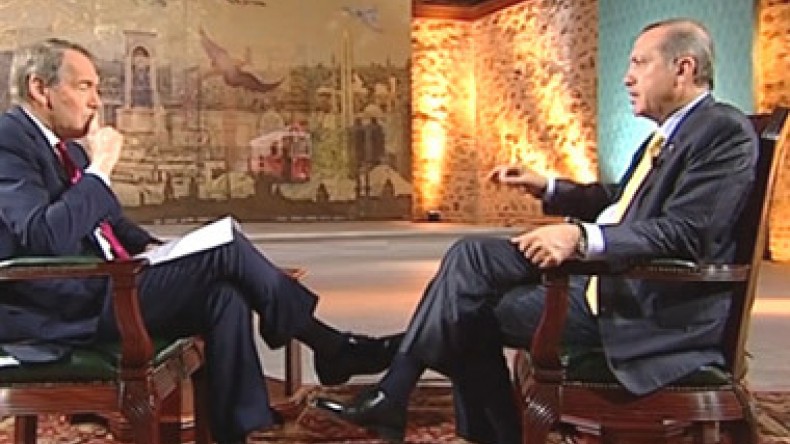
Erdogan denies Armenian Genocide in interview with Charlie Rose
On Sunday’s edition of Charlie Rose, the veteran reporter asked Turkish Prime Minister Recep Tayyip Erdogan, who on April 23 issued a statement offering condolences to the grandchildren of what he termed Armenians who suffered during the Ottoman Empire, whether the Turkish Prime Minister would use the word Genocide in describing the events of 1915, according to Asbarez.
Erdogan’s response: “If such a Genocide occurred would there have been any Armenians living in this country?”
Throughout the portion of the interview dedicated to the Armenian issue, Erdogan reiterated the reality that there were Armenians living in Turkey, citing that as proof of his continued denial of the Armenian Genocide.
He also went on to claim that Turkey “would never a turn a blind eye” to Genocide, as the Turkish people view that as a crime against humanity.
After reiterating the long-standing Turkish position to establish a commission to study the Armenian Genocide, Erdogan also blamed the Armenian Diaspora for “exploiting the situation,” saying that the Diaspora’s efforts should be rejected.
Interestingly, Rose followed up his questions about the Armenian Genocide with one that focused on an apology offered to Erdogan by Israeli Prime Minister Benjamin Netenyahu and Turkey’s belief that it deserves compensation from Israel for the Mavi Marmara incident. Erdogan said that Turkey should be compensated as a pre-condition to establishing normal diplomatic relations with Israel.
Read below a transcription of the portion about the Armenian Genocide.
Charlie Rose: This has been an important week for you because of the statement you made on Armenia.
Recep Tayyip Erdogan: This has been something I have been saying for a long time. Every time I said this I said they were ottoman citizens. There were Armenians and people belonging to other ethnicities who died in many events. And, I always said that it is very natural for all ethnicities to remember their suffering and we have to respect that. We have in our territory many Armenian citizens, some who have passports and some don’t. There are some who live here without passports and we do not send those people away. Those Armenian continue to live here. We also respect the belief and freedom of thoughts of Armenians and we will continue to protect those rights.
C.R.: They would obviously like you to use the word Genocide. Is it possible for the prime minister of Turkey to characterize it as Genocide?
R.T.E.: It would not be possible, because if such a Genocide occurred would there have been any Armenians living in this country?
We have citizens here who have passports and also Armenians who have left Armenia. We don’t exclude them. We don’t send them back. They make a living in our country and they continue to live in our country.
We are a people who see Genocide as a crime against humanity. We would never turn a blind eye to such action. And, we always say this is a responsibility for historians. Our archives are open and historians can come and look at our archives. We have military archives as well. If Armenia has archives they can open theirs and if third countries have documents, they too could make them available and we can establish a commission made up of historians and legal experts and political scientists who can them look at those documents and they can then come up with a report and we can all respect those reports.
The [Armenian] Diaspora is exploiting that situation and I don’t think we should accept that. There is no reason why we should have any doubt or suspicion. That should not be the case and no one has the right to say that.
C.R.: But you are saying we have to recognize their suffering… and is there an apology there?
R.T.E.: These are our ancestors. This is not something that happened during the Republic of Turkey. This was during the Ottoman Empire. These are events that happened during migration and documents are very interesting. If the documents show that our ancestors made a mistake… if the historians can show that then we would pay whatever the consequence of that is.
Newsfeed
Videos






























